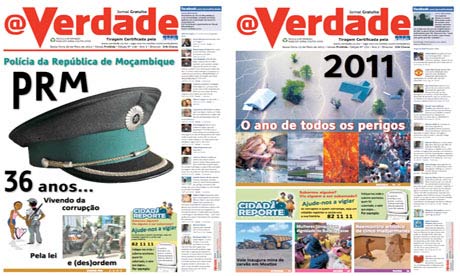
When Jornal@Verdade hit the streets of the Mozambican capital, Maputo, observers predicted the weekly newspaper would not last three months. Now in its third year, @Verdade (truth, in Portuguese) continues to confound sceptics. Its founder and director, Erik Charas, says with a measure of satisfaction: "One thing I know is we won't be closing anytime soon."
@Verdade, which declares itself to be "non-political", is also published online. But it is an unusual newspaper, and not just for the @ in its name – a symbol aimed at bridging the information gap between those who see it as just another beautiful "a" and the online generation: it is distributed free of charge in Maputo and four other towns to people who could otherwise not afford to buy a newspaper.
The newspaper's aim is to expand access to information as a tool for social transformation. The idea, explains Charas, a South Africa-trained engineer turned corporate leader, came from a realisation that most people in Mozambique lacked access to quality information about their government, country and the world.
Between a half and three-quarters of the 23 million Mozambicans live in poverty. With a newspaper costing up to $0.75, information does not rank highest on many people's priorities. "For the price of a newspaper, you can buy eight loaves of bread and each loaf can feed four people for a day," Charas says, adding that people say "you can't eat news".
Charas raised about 80% of the money and a few colleagues contributed 20% to set up the £500,000 operation, whose goal is to "feed the brain" of people who barely manage to "feed the stomach". Like any other newspaper, @Verdade largely depends on advertising and partnerships with other firms. The print run oscillates between 20,000 and 50,000 but @Verdade is read by about 400,000 people per week, giving it the country's biggest readership.
But of what significance would this be in Mozambique? The country is only starting to recover from a 16-year year civil war that ended in 1992, and now posting economic growth rates of 6%. And huge disparities remain: half of the adult population cannot read or write; more than 80% do not have access to electricity; and 12% carry HIV, the virus that causes Aids.
So, how much can @Verdade do to change this? Charas believes the Mozambican people need ambition and a voice. By providing information about health and other issues, and reporting on better alternatives, readers could seek out those alternatives. And the paper gives them a voice to put their demands across, for example, by using crowd sourcing techniques to get ideas about failing public services, follow them up and develop them into news reports that put pressure on the relevant authorities.
In one such scheme @Verdade carried stories from electricity users whose home appliances were breaking down due to power surges; this forced an existing but barely known sector regulator to come out and call public meetings to address the problem.
"@Verdade was designed and set out to be a tool for development," says Charas. "The development of the citizen, the human being who is entitled to be an active participant of their country's economy simply by being informed. By being able to take or make informed decisions. By being able to speak and be heard. By being allowed to dream, to want and to do. And to change things."
Yet, with low literacy levels and with radio being a major source of information in poor countries, how much can a Portuguese-language newspaper do to bridge the information gap? Charas understands this and says @Verdade's long-term plans will include radio. However, the choice of the newspaper was influenced by research which showed that people considered television to be a source of entertainment, and radio as too unreliable. "They told us that on radio it was very easy and simple for people to just say things and then on the next day just say something else or unsay what they said before. And then they told us, but if it's written then it's the truth."
While this won't address information needs of the majority who are not literate, for now @Verdade seems to be content to concentrate on the literate few. So far, the experiment seems to be working, as Charas can see this from the public's response, some sending information and comment to @Verdade by SMS or through Facebook from places that the paper is not even distributed. A study by Paul Collier, Jenny C Aker and Pedro C Vicente about the 2009 national elections also found that access to @Verdade had increased political participation by 10%.
Mozambique, says Charas, has good laws on press freedom but by toeing an independent or "pro-people" line, @Verdade seems either not to be taken seriously or even discriminated against. It often misses out on press releases and advertising from government-controlled firms and departments, and its journalists aren't invited to join presidential tours inside the country. This is comparable to "living like outcasts", Charas says, adding that "it won't break us" as the paper has support from companies not controlled or influenced by the government.
Besides people texting ideas and questions and then getting answers through the paper, Charas says @Verdade is looking at other mobile-based products: "The mobile phone is essential because penetration is high, but some things like how to meet the cost are not yet clear." For now, though, @Verdade, the written truth, is free.







